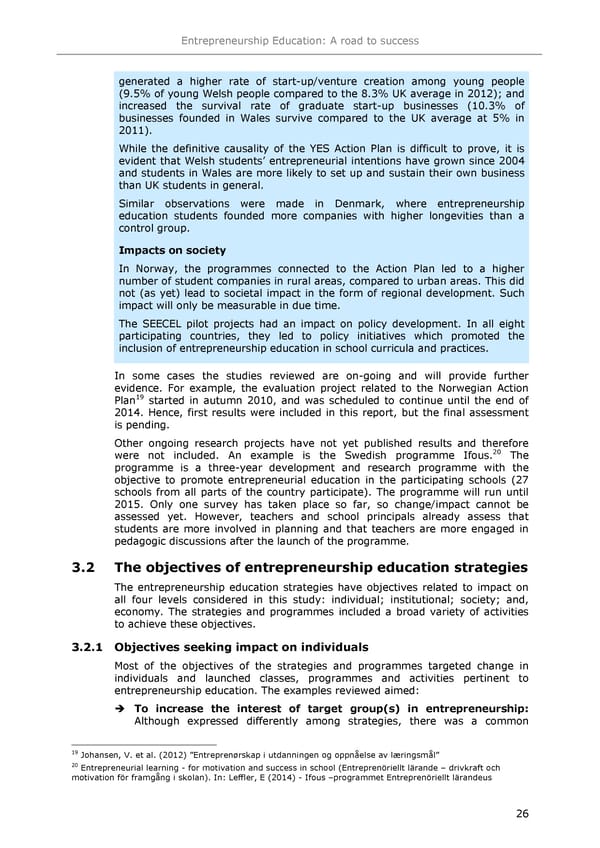Entrepreneurship Education: A road to success generated a higher rate of start-up/venture creation among young people (9.5% of young Welsh people compared to the 8.3% UK average in 2012); and increased the survival rate of graduate start-up businesses (10.3% of businesses founded in Wales survive compared to the UK average at 5% in 2011). While the definitive causality of the YES Action Plan is difficult to prove, it is evident that Welsh students9 entrepreneurial intentions have grown since 2004 and students in Wales are more likely to set up and sustain their own business than UK students in general. Similar observations were made in Denmark, where entrepreneurship education students founded more companies with higher longevities than a control group. Impacts on society In Norway, the programmes connected to the Action Plan led to a higher number of student companies in rural areas, compared to urban areas. This did not (as yet) lead to societal impact in the form of regional development. Such impact will only be measurable in due time. The SEECEL pilot projects had an impact on policy development. In all eight participating countries, they led to policy initiatives which promoted the inclusion of entrepreneurship education in school curricula and practices. In some cases the studies reviewed are on-going and will provide further evidence. For example, the evaluation project related to the Norwegian Action 19 Plan started in autumn 2010, and was scheduled to continue until the end of 2014. Hence, first results were included in this report, but the final assessment is pending. Other ongoing research projects have not yet published results and therefore 20 were not included. An example is the Swedish programme Ifous. The programme is a three-year development and research programme with the objective to promote entrepreneurial education in the participating schools (27 schools from all parts of the country participate). The programme will run until 2015. Only one survey has taken place so far, so change/impact cannot be assessed yet. However, teachers and school principals already assess that students are more involved in planning and that teachers are more engaged in pedagogic discussions after the launch of the programme. 3.2 The objectives of entrepreneurship education strategies The entrepreneurship education strategies have objectives related to impact on all four levels considered in this study: individual; institutional; society; and, economy. The strategies and programmes included a broad variety of activities to achieve these objectives. 3.2.1 Objectives seeking impact on individuals Most of the objectives of the strategies and programmes targeted change in individuals and launched classes, programmes and activities pertinent to entrepreneurship education. The examples reviewed aimed: To increase the interest of target group(s) in entrepreneurship: Although expressed differently among strategies, there was a common 19 Johansen, V. et al. (2012) =Entreprenørskap i utdanningen og oppnåelse av læringsmål= 20 Entrepreneurial learning - for motivation and success in school (Entreprenöriellt lärande 3 drivkraft och motivation för framgång i skolan). In: Leffler, E (2014) - Ifous 3programmet Entreprenöriellt lärandeus 26
 Entrepreneurship Education Page 29 Page 31
Entrepreneurship Education Page 29 Page 31